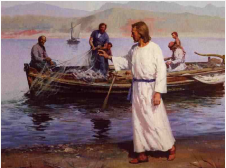We walked along the sidewalk and there were flower gardens, lawn, shrubs and trees all along the way. He was holding my hand – it was a stretch for both of us for he was only 2 years old. The weather was warm and lovely, typical for springtime in Virginia, and there were ants and various bugs crawling everywhere celebrating the rites of spring. My nephew caught sight of these critters and nothing would do but he had to let go of my hand and crawl along following a busy colony of something. He was lost in amazement, completely outside of himself in wonder as he crawled through puddles and over rock in pursuit of the mystery of this life.
I have always held that memory as a classic understanding of what it means to wonder. Wonder is very different than thinking about, analyzing, processing, discussing and debating, working through and a dozen other ways in which most adults stand in front of daily reality. With a “hands-on-hip get the job done” attitude none of us seem to have much time for … wondering. In fact wondering is likely considered a waste of time in many circles and that’s a shame.
Abraham Heschel, the late and brilliant Jewish theologian and philosopher, wrote a lot about wonder. I like these words: “The beginning of our happiness lies in the understanding that life without wonder is not worth living.” To me the issue relates to how one stands in the world in front of the mystery and beauty of creation and all life. Not to wonder seems to leave two options: dismiss the great mysteries of life or believe everything can be understood and figured out. The latter opens one to unsustainable arrogance and failure and the former seems nothing short of foolish.
It is only our capacity for wonder that opens us to the transcendent and the mystery that is life and the universe. In one of his writings Heschel says that the person who never wonders cannot find God. Is it possible that our present time of efficiency, productivity and astonishing advances in so many levels have come at a price? The cost has been an increase of secularism and a diminishment of wonder – be it in art, music, theatre and religious practices.
Professor Heschel’s formula for a life well lived is as follows: “Our goal should be to live life in radical amazement. ….get up in the morning and look at the world in a way that takes nothing for granted. Everything is phenomenal; everything is incredible; never treat life casually. To be spiritual is to be amazed.”
Once again, our children can teach us. Jesus was clear in His teaching – we are to become like children and perhaps that is so we can re-capture our sense of wonder in our everyday life for as Heschel says, “Wonder rather than doubt is the root of all knowledge.”
Fr. Ronan

January 26 ~ Third Sunday Ordinary Time
Today’s readings are filled with inspiration and instruction.
Isaiah reminds us that we no longer walk in darkness.
For us, the ‘great light’ he speaks of is Jesus Christ.
In the second reading, Saint Paul urges the community to
“be united in the same mind and in the same purpose” and
“let there be no division among you.”
In the gospel, Jesus invites the first Apostles:
ʺCome after me, and I will make you fishers of men.ʺ
Do you see yourself as a fisher of men/women?
Each of the readings offers us good advice for our time!
Which one is God inviting you to give attention to in your life?
